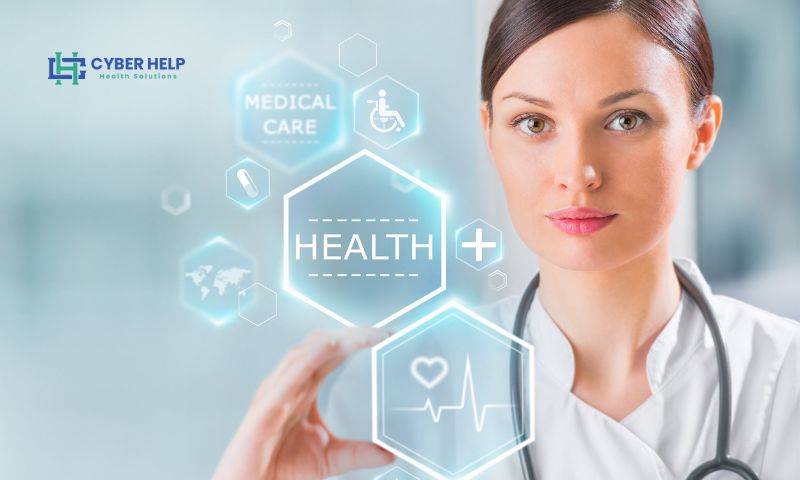After the fact management of claims, denials are expensive and result in unneeded delays in revenue realization or revenue loss. The best method to prevent denials is not to rely solely on the Medical Coding / Insurance teams after the consultation. In a “Zero Denial” environment, a good system starts working long before the doctor’s appointment.
With denials being avoided early, much before the case reaches your insurance/medical coding teams for claim submission, Cyberhelp’s health RCM solution can assist you in achieving close to “Zero Insurance denial.”
Throughout consultation activities, RCM optimization
The doctor can be given several tools via the Cyberhelp Health System to help prevent claim denials as early as possible during the consultation. The following are some of the main components of the Cyberhelp Health System that aid in this process:


If a patient's insurance does not cover a service, the system automatically highlights it for the doctor to see.
Cyberhelp Health System flags the “out of coverage” services to the doctor while the doctor is ordering any service, allowing the doctor to avoid them and only order services that are covered by the patient’s insurance policy. If the patient is willing to pay out of pocket for the care, the doctor may decide to prescribe an “out of coverage” service.
Customer service is intimately related to the biggest revenue cycle issues:
By reducing A/R days and increasing cost collections, customer service has a positive effect on the bottom line.
The most expensive revenue cycle concerns that are directly related to first-point-of-contact customer service are as follows:
- 90% of denials are avoidable, yet only 66% of them can be recovered.
- Inadequate insurance information.
- Duplicate, erroneous, and missing patient data.
- Uncomprehension on the part of the patient regarding their financial obligations and accessible payment methods.
- Transferring accurate and pertinent information from patient to patient is crucial. It also cannot be emphasized enough.
- Better RCM services for hospitals and technology that reduces human error can help with a few of these problems.
- Customer service abilities are also required for the process. To get the essential and accurate information and assist the patient, hospital staff must be able to listen attentively, detect signs of financial distress through verbal and nonverbal indicators, and interact successfully with worried, fearful, and occasionally irritated people.
Customer service impacts the results of clinical care:
- Academic studies repeatedly demonstrate that a variety of vital clinical care outcomes are related to patient experience or pleasure.
- In actuality, this holds in a variety of locations, disease subtypes, outcome measures, and research layouts.
- Clear and open communication, which is necessary for accurate diagnosis and treatment, is more likely to be followed and passed through by patients who feel good about their healthcare experience.
- Patients who are at ease with their treatment are also less likely to experience stress, which can impair their recovery.
- RCM services for hospitals may succeed at providing the best patient care by offering the best customer service.
The principal diagnosis is checked by the system.
The Cyberhelp Health System can be set up so that doctors can only issue orders once the “Principal Diagnosis” has been recorded. Additionally, medical facilities may require that any additional information, such as “Patient Complaints” or “History of Presenting Illness-HPI,” be compulsorily recorded by the physician. The claim success rate can be increased by making sure that the Patient Complaints and HPI are included in the authorization and claim XML as observations.
The clinicians are not required by the Cyberhelp health System to recall the ICD codes for the diagnosis. Doctors can search for diagnoses as text, and the system will automatically return results based on alias names, short and long descriptions, and other criteria in addition to the master list of ICD codes.


Examine medical necessity for orders
The Cyberhelp health care services can determine whether or not all of the “orders, services, and activities” in the consultation for a diagnostic capture would pass the claim process or if it is likely to fail the “Medical Necessity” check. For this, Cyberhelp Health integrates with a third-party product and performs the check-in-process while the client is receiving a consultation. Additionally, the system is capable of recommending a “different/more precise” diagnosis that will enable the “order, service, or activity” to proceed with authorization and claim.
As a result, there will be fewer rejections because the doctor can alter the procedure’s order or make the proper diagnostic for the patient’s situation well in advance.
'Consult Evaluation Type' Capture for Specific Specialties
Depending on the “Type of Evaluation” carried out during the consultation, the consultation fee for some specialties can change. The specialties in “Dentistry” and “Psychiatry,” are frequently employed. The billing procedure is automated by the Cyberhelp Health System and enables such configuration for any specialty.

